On March 30, 2015, the Islamic State (ISIS) released the eighth issue of its English-language magazine Dabiq. The 68-page issue, which is titled "Shari'a Alone Will Rule Africa", features several articles pertaining to Africa. Among them is a congratulatory article on Boko Haram's recent joining of ISIS; praise for the ISIS attack on the Bardo Museum in Tunisia, which was presented as part of an article that praised other ISIS attacks; a report about the events in Libya, which focused on criticizing ISIS's enemies there; and an interview with a man who assassinated a Tunisian politician in 2013, who calls upon Muslims in France to carry out attacks against the unbelievers. The issue features two articles that criticize the various Syrian opposition groups, including Al-Qaeda's branch in Syria, Jabhat Al-Nusra, while accusing them, inter alia, of using Islam and jihad to promote their agenda and of collaborating with the West and other Arab regimes. The issue also features articles that justify some of ISIS's practices, namely its indoctrination of children and its destruction of archeological relics. Similar to previous issues of Dabiq, the current issue continues its call for Muslims living in the West, which ISIS calls the "lands of shirk [polytheism]," to make hijra to the Islamic State. It also features an article by a Muslim woman who calls upon all other women to immigrate to the Islamic State. The issue also includes an article by British prisoner John Cantlie, in which he discusses the U.S.'s policy towards ISIS.
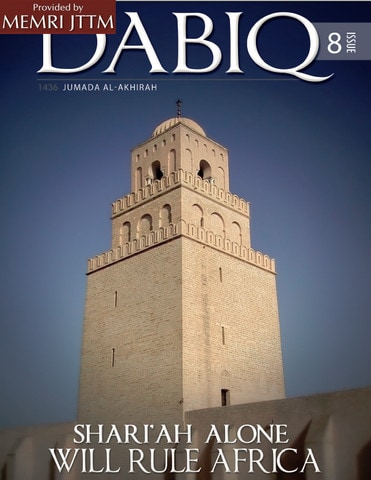
The issue includes other items, like promotions for ISIS releases, as well as a section titled "In The Words Of The Enemy," which includes references to ISIS from former Republican senator Rick Santorum (who the magazine calls a "Catholic Crusader"), former CIA officer Gary Berntsen, and Virginia state Sen. Richard Black.

The following is a review of the main items in the issue:
Forward Rejects Nationalism, Says Unbelievers "Can Never Be The Equals Of The Muslims," Praises Attacks In Yemen, Tunisia And Europe
The issue's forward reiterates the idea that within the Islamic caliphate, Muslims are equal regardless of their national or ethnic background. There, it says, "their blood mixed and became one, under a single flag and goal." The forward reiterates ISIS's call to Muslims everywhere to make hijra to it, while criticizing the notions of nationalism, patriotism, and tribalism. Those, it says, have never been the driving force inside a mujahid's heart. In that regard, it calls upon Muslims to reject nationalism, which, it says, confines their sense of religious brotherhood to manmade borders. It also notes that nationalism looks upon people equally regardless of their religion. On the other hand, the forward notes the obligation upon Muslims to fight anyone that stands in the way of their religion, while adding that the unbelievers "can never be the equals of the Muslims even of both were to come from the same land." Pointing to those who it says rejected nationalism and carried out attack on behalf of ISIS or in its name, the issue praises the perpetrators of those attacks. It also mentions Abu Ramadan Al-Muhajir (Omar Abdel Hamid El-Hussein), the attacker of a Copenhagen café and a synagogue, as a prime example of a Muslim who denounced nationalism. "Abu Ramadan did not let national borders and skies stop him. He did not let a 'citizenship' he disbelieved in prevent him from obeying his Lord... and retaliating for his brethren in the khilafa." The forward praises Abu Ramadan's attacks, which it calls were "brave" and "selfness." It also notes that those attacks, as others as well, are a testimony that ISIS is "here to stay."
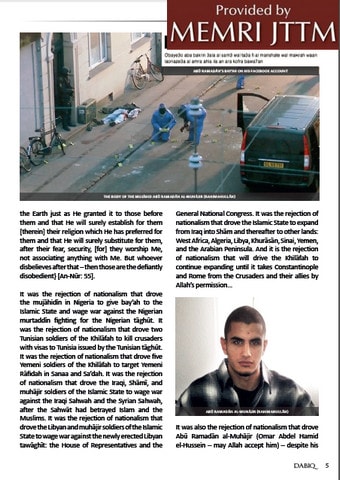
Articles Criticize Islamist Syrian Opposition Groups, Accuse them Of Collaboration With The West And Gulf States, Warn Of Their Fate
The issue features two articles that criticize the various Syrian opposition factions, namely those presenting themselves as Islamic and jihadi ones. The first article, titled "The Allies Of Al-Qaeda In Sham," criticizes the Jabha Al-Shamiya, a union of five large Islamic organizations established on December 24, 2014, and operating in the Aleppo province, and accuses it of receiving aid from the West and from the Gulf states. The article questions some of the Jabha's supposed "Islamic" agendas, such as its call to implement the shari'a, while noting the group's nationalistic goals. The article also criticizes Jabhat Al-Nusra, and accuses it of turning a blind eye to these groups' mistakes. The second article, titled "Irja' – The Most Dangerous Bid'ah [innovation] (And Its Effect On The Jihad In Sham)," deals in length with the historic meaning and root of irja' and the group of Muslims, i.e. the Murji'ah[1], who followed it. The article warns against irja', calling it a "deviant innovation that diluted the region of the Muslims." It also notes the irja's contemporary manifestation and its group of followers among Muslims. In that regard, the article divides the various Syrian opposition groups into four groups (Islamic factions with an international agenda, 'Islamic' factions with a nationalist agenda, nationalist factions with an 'Islamic' agenda, and secularist factions with a democratic agenda), while accusing mainly the second and third groups of being "infected" by irja'. All in all, the article accuses all groups of receiving aid to various degree from other Arab regimes and from the West as well, and of fighting ISIS.
Praise For Boko Haram Joining ISIS
One article in the issue welcomes Nigerian jihad group Jama'at Ahl Al-Sunna lil-Da'wa Wal-Jihad (Boko Haram) for recently joining ISIS.[2] It notes that the move came on the heels of a widely successful campaign by Boko Haram across Nigeria and neighboring regions, and that it caused tremendous celebration among Muslims.
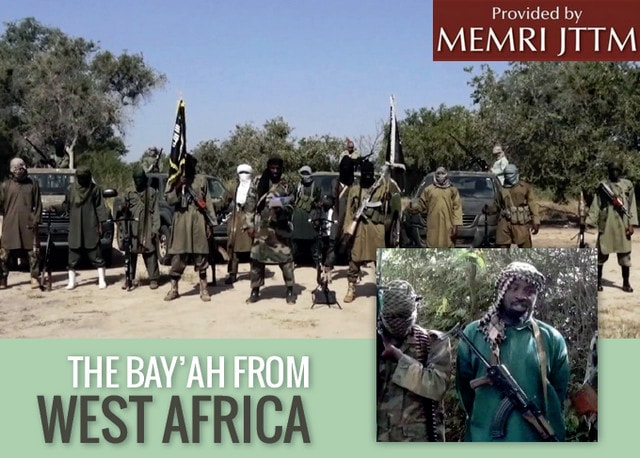
Praise For Attacks Against Houthis In Yemen, Tourists And Tunisians At Bardo Museum
In an article titled "Soldiers Of Terror," the issue praises the recent ISIS attacks against Houthis in Yemen, and the attack on the Bardo Museum in Tunis. The article echoes the notion that the attacks transcended countries' borders, visas, and passports, and that they were carried out instead by men "whose allegiance lies, not with a false citizenship, but with Allah, His Messenger, and the believers." It further says that the attacks were meant to send a "forceful message" to the unbelievers and apostates. Speaking about the Tunisia attack, the article says that its perpetrators received training in Libya. It also notes the attack's impact on the coalition countries whose citizens were killed at the museum. Moving on to the deadly attack against Houthis in Yemen, the article notes the high number of casualties it resulted it. It also criticizes Al-Qaeda in the Arabian Peninsula (AQAP) for its denunciation of the attack,[3] while accusing it of having a double-standard vis-á-vis attacking Houthis: "The Yemeni branch of Al-Qaeda came out and exposed its two-faced nature by denouncing the attack and reaffirming their adherence to [Ayman] Al-Zawahiri's guidelines, as if to imply that the Islamic State's operation was carried out against Sunnis in a public place of gathering not specific to the Houthis, when in reality the opposite was true."

'The Lions Of Tomorrow' – Praise For ISIS Child Indoctrination
One article praises ISIS's efforts in training and indoctrinating children, who are referred to as the next generation of mujahideen. It notes that ISIS has been preparing its Ashbal (lion cubs) and honing their military skills so that they will be prepared "to face the Crusaders and their allies." The article includes the images of two children who appeared in separate ISIS video, in which they executed various spies.[4] The article also defends ISIS's use of "child soldiers" while noting that they were used by Muhammad in the past.
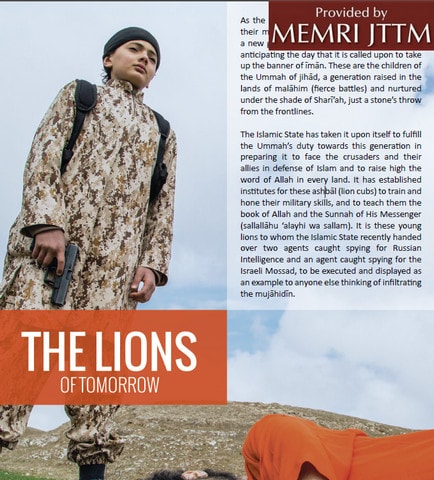
ISIS Justifies Destruction Of Archeological Treasures
One article, titled "Erasing The Legacy Of A Ruined Nation,"[5] justifies ISIS's destruction of archeological and artistic treasures as seen in the case of Mosul's museum.[6] The article argues that the destroyed items represented idols, whose worship is forbidden in Islam. It also says that those items were also venerated by the general public, and had caused people to stray from the worship of Allah.
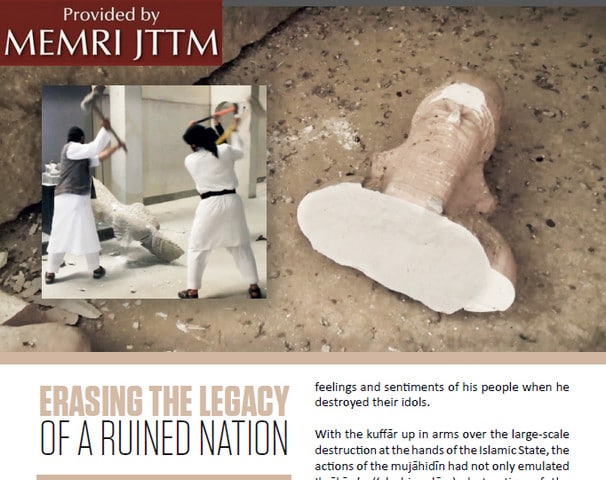
ISIS Denounces Parliaments In Libya, Says Libya Is An "Ideal Land" For Hijra For Those Who Can't Come To Syria, Namely Those From Africa
One article focuses on Libya, and recounts ISIS's spread there and the challenges it faces. The article notes Libya's two parliaments, which it denounces and accuses of apostasy. Speaking about the Tripoli-based Islamist-led parliament (the GNC), the article says it is merely a continuation of the heretic Qadhafi-era constitution. It also criticizes it for adopting democracy, and for attempting to implement a "butchered form" of shari'a in the country. The article also denounces certain members of the GNC such as former LIFG (Libyan Islamic Fighting Group) member Abdelhakim Belhaj, whom, along with others, it accuses of apostasy. Speaking about the future of ISIS in Libya, the article notes that ISIS continues to enjoy greater consolidation there, and that it aims to expand further. It also notes that Libya "has become an idea land of hijra for those who find difficulty making their way to Sham, particularly those... in Africa."
Call For Westerners And Others To Make Hijra To ISIS
The issue includes a call to Muslims living in the "lands of shirk [polytheism]," to make hijra to ISIS, which is supported by a number of hadiths. An image of a supposed muhajir standing in an airport terminal on his way to ISIS is contrasted with the image of a man carrying a backpack, referencing his arrival to the caliphate.

Call For Women To Make Hijra
The issue includes an article written by a Muslim woman who made hijra to ISIS.[7] The author recalls her encounter with other women who also immigrated to ISIS along the way. The woman urges all Muslim women to follow in her footsteps, and says that hijra to the caliphate is mandatory.
Interview With Assassin Of Tunisian Politician Who Calls Upon Muslims In France To Carry Out Attacks Against The Unbelievers There
The issue features an interview with Abu Muqatil Al-Tunisi,[8] the assassin of Tunisian politician Mohammad Brahmi, who was killed in July 2013. Al-Tunisi reveals the motives behind Brahmi's assassination, which, he says, were primarily directed at stirring up chaos in Tunisia to facilitate the movement of jihadis and weapons in and out of the country. Al-Tunisi also addresses Muslims in France, calling upon them to fight the enemies of Allah and to emulate other terrorist attacks that were committed in Europe. "I call them to follow the method of the brothers who executed operations in Europe... Do not look for specific targets. Kill anybody. All the kuffar over there are targeted." Al-Tunisi further warns the unbelievers in France that ISIS is getting closer to France (namely after it established itself in Libya): "Soon, by Allah's permission, you will see the banner of 'la Ilaha Illallah' fluttering over the Elysee Palace. The Islamic State is close now. Between us and you is the sea... The march is advancing towards you. And inshallah, your women and children will be sold by us in the markets of the Islamic State."
.jpg)
Endnotes:
[1] The Murji'ah was an early Islamic school which believed that Allah alone can judge the quality of a Muslim's faith.
[2] See MEMRI JTTM report Boko Haram Pledges Allegiance To ISIS Leader Abu Bakr Al-Baghdadi, March 7, 2015.
[3] See MEMRI JTTM report Islamic State (ISIS) Claims Responsibility For Deadly Attacks On Houthis In Yemen, March 20, 2015.
[4] See MEMRI JTTM report Islamic State Video Shows 'Mossad Spy' Executed By Young Boy, March 11, 2015; WARNING - GRAPHIC IMAGES: Islamic State (ISIS) Video Shows Confession, Execution By Young Boy Of Two 'FSB Agents', January 13, 2015.
[5] See MEMRI JTTM report In Dabiq Article ISIS Justifies Smashing Archeological Treasures, March 31, 2015.
[6] See MEMRI MTV No. 4801 ISIS Destroys Archaeological Treasures in Mosul, February 26, 2015.
[7] See MEMRI JTTM report In Eighth Issue Of Dabiq Magazine, Female Islamic State Member Urges All Muslim Women to Emigrate, March 31, 2015.




